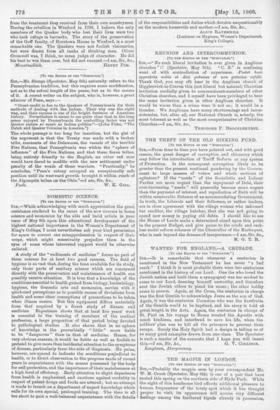DOMESTIC SCIENCE.
[TO TEE EDITOR or THE "SPECTATOR."]
SIR,—While acknowledging with much appreciation the great assistance rendered to the cause of the new courses in home science and economics by the able and lucid article in your issue of May 8th upon this educational development of the highest national importance in the Women's Department of King's College, I must nevertheless ask your kind permission for space to correct one misapprehension in respect of their scope, which might conceivably prejudice them in the eyes of some whose interested support would be otherwise enlisted.
A study of the " rudiments of medicine " forms no part of these courses for at least two good reasons. The field of hygiene is so vast that, during the time available for its study, only those parts of sanitary science which are concerned directly with the preservation and maintenance of health can possibly receive attention. It is true that a knowledge of the conditions essential to health gained from biology, bacteriology, hygiene, the domestic arts and economics, carries with it quickened perceptions as to possible causes of deviations from health and some clear conceptions of precautions to be taken when illness occurs. But this equipment differs materially from that acquired by a direct study of disease and medicine. Experience shows that at least five years' work is essential to the training of members of the medical profession, a large proportion of that period being devoted to pathological studies. It also shows that in no sphere of knowledge is the proverbially " little " more liable to be "dangerous" than in that of medicine. Hence, for very obvious reasons, it would be futile as well as foolish to pretend to give more than incidental attention to the symptoms of disease, particularly from the side of diagnosis. No pains, however, are spared to indicate the conditions prejudicial to health, or to direct observation to the progress made of recent years in acquaintance with the means possessed by the body for self-protection, and the importance of their:maintenance at a high level of efficiency. Early attention to slight departures from health is emphasised, and cautions against credulity in respect of patent drugs and foods are uttered ; but no attempt is made to trench on a department of expert knowledge which calls for its own special, prolonged training. The time is all too short to gain a well-balanced acquaintance with the details of the responsibilities and duties which devolve unquestionably on the modern housewife and mother.—I am, Sir, &c., ALICE RA.VENHILL
(Lecturer on Hygiene, Women's Department, King's College).










































 Previous page
Previous page